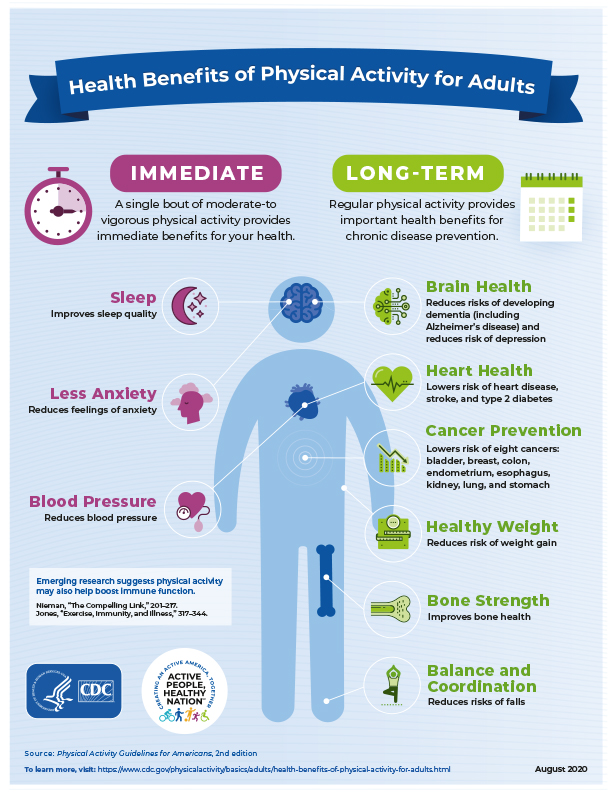
Here are five tips for healthy living for adults. Reduce alcohol consumption, reduce processed food intake, exercise more, and lower stress levels are all good ways to stay healthy. Here are some tips to help you live healthier. These tips will help you to have a healthier lifestyle and a stronger immune system.
Reduce alcohol intake
There are many reasons that you should limit your alcohol intake. Perhaps the most important reason, however is the increase in cancer risk. Alcohol can also increase the risk of developing cancer. Apart from being a health risk for others, alcohol can also cause embarrassment. Even though alcohol is safe in small amounts, moderate consumption should be avoided. Below are some healthy living tips for adults to reduce your alcohol intake.
First of all, don't drink too late at night. You might find yourself drinking more if you do drink late at nights. This could be a sign that you should look for a non-alcohol-related activity. Drinking too soon in the evening leads to long sessions. Drinking too early in the evening can lead to longer sessions.
Reduce consumption of processed foods
Cutting down on processed foods can significantly improve your health and overall lifestyle. Even though cutting out all processed foods can seem overwhelming for some, it is possible to make small adjustments. Drinking soda is not a good idea if you like processed food. Instead, try fruit-infused water. You can also choose to eat whole fruits over the processed versions. These small changes can make all the difference in your overall health and nutrition.

Instead of buying the processed variety, pick up a bowl of fresh fruit. Whole fruit is better than processed or added sugar. This will allow you to eat more and prevent snacking. Also, fresh fruits and vegetables are great sources of fiber. And, if you must eat meat, try to find less-processed forms or plant-based varieties. It is important to engage in enough physical activity each day.
Exercise with your whole family
You can add physical activity to your daily routine, regardless of whether you live in a city or on a rural property. Finding activities that fit in your daily schedule and are fun for both of you is the key. Running, walking and playing games are all great family activities. YouTube videos show many different family activities. You can combine physical exercise with family outings and holidays, depending on the age of your family.
Start small. Not everyone has to spend hours creating complicated plans. Simply look for opportunities to be more active with your family. Consider parking further from your destination and taking the stairs rather than the elevator to get there. Then, walk to the corner store. Try something new! Playing outside in winter is a great way for you to have fun and spend some time with your loved ones. Play a game or go to the park together.
Reduce stress
High levels of stress can negatively impact your health. To minimize the effects, consider talking to your doctor about how you can manage stress in your life. Your doctor may recommend medication or therapy for a temporary fix. If you feel stressed out, it is worth taking the time to identify the cause and allow yourself extra time to manage them. It's worth taking a little more time to deal with stress. Here are some tips to help you reduce stress and make sure you get the most out your time.

Avoid stressful situations. Although alcohol and drugs can temporarily reduce symptoms, they will not fix the underlying problem. The long-term effects of using such drugs can be detrimental to your health. Live safely. Avoid traffic and evening news. Instead, walk or bike instead of driving in order to avoid unnecessary stress. Online shopping is a great option if you find shopping stressful. By avoiding stressful situations, you will be less likely to be injured.
FAQ
Is there something wrong with me if I'm depressed?
Depression is a problem that teens often face. It is important to recognize that depression affects many teens.
It doesn't mean you are insane or weak. Most people who are depressed aren't aware of it. Depression is a medical condition.
There are many types of depression. Some people feel only sadness, while some others experience other emotions. There are also different levels.
Some people are mildly depressed while others experience severe depression. It is important to remember that not all depression is bad. Sometimes, depression helps us to cope with stressful events.
However, if you find yourself feeling demotivated or sad all the time, you should consult your doctor. Your doctor can diagnose you, and help you decide whether treatment is necessary.
What are some mental-emotional issues?
Mental disorders include any condition that causes significant distress or impairment in functioning. Mental disorders include anxiety, bipolar disorder (depression), schizophrenia, borderline personality disorders, obsessive-compulsive disorders, post-traumatic stress disorder (PTSD), eating disorders, substance abuse and other.
How do you know if you have a mental illness?
Persons may be diagnosed with mental illness if they have symptoms that are disruptive to their daily life. The symptoms of mental disorders vary from person-to-person. The most common symptoms of mental illness are sadness, anger, guilt, hopelessness and loneliness.
If a person meets at least three of the four criteria below, they may be diagnosed with a mental disorder.
-
Troubled thoughts or feelings
-
Disturbed behavior
-
Disturbance to functioning
-
Inability to relate to others
Why is it so important to improve our emotional health?
For happiness and well-being, emotional health is crucial. A person who isn't emotionally well will be unable to perform at their best. People with depression are often unable to work efficiently. People with depression may also have anxiety, panic attacks and insomnia. The good news about these conditions is that they can be successfully treated using medication and therapy.
Why is mental health so important for students?
Students' mental health is crucial because it allows them to be focused on school and excel academically. You can't do well at school if your mind isn't in the right place. Students with depression frequently miss class which can lead to low grades. This could lead to students dropping out of high schools and eventually going to college.
If you're struggling with depression, you should speak to your parents or teachers. They'll be able to help you get the care you need.
Not everyone with depression requires medication. Talk therapy is very effective for many people. If you are interested in getting help, you should see a counselor.
What is the importance of mental health?
Mental health is essential for everyone. Mental health is crucial for all people. Maintaining a healthy mind is crucial.
Our bodies can start to feel stressed if we don't feel well. This can lead to problems like headaches, stomach aches and backaches. Our bodies and minds must be well looked after.
Statistics
- More than 50% will be diagnosed with a mental illness or disorder at some point in their lifetime.3 (cdc.gov)
- Neuropsychiatric diseases are the leading cause of death and disability in the U.S., accounting for 18.7 percent of all years of potential lifespan loss and premature mortality.
- In any given year, an estimated 18.1% (43.6 million) of U.S. adults ages 18 years or older suffered from any mental illness, and 4.2% (9.8 million) (healthypeople.gov)
- Similarly, for positive mental health, there is likely to be substantial agreement about some typical components (e.g., resilience to stress) 6, and controversy about more atypical components (e.g., career consolidation). (ncbi.nlm.nih.gov)
- It means no drinking any alcoholic beverages and no taking any drugs that aren't 100% natural.
External Links
How To
How to Determine if a Mental Health Expert is needed
These signs will help you determine if you should seek professional help. If you are noticing any warning signs, consult a doctor.
-
It feels like you are losing control of your life.
-
You are having difficulty sleeping.
-
Your thoughts seem to race when you try to concentrate.
-
You find yourself thinking about suicide.
-
You feel hopeless.
-
It feels like your life isn’t worth living.
-
You're losing interest in the things that you once loved.
-
You have stopped eating.
-
You are now withdrawn.
-
To cope with stress, you may have tried to use drugs or alcohol.
-
You have begun to lose friends or family members.
-
Other physical symptoms, such as stomachaches, backaches and headaches may also be present.
It is imperative that you see a doctor immediately if you are experiencing any of the above symptoms.